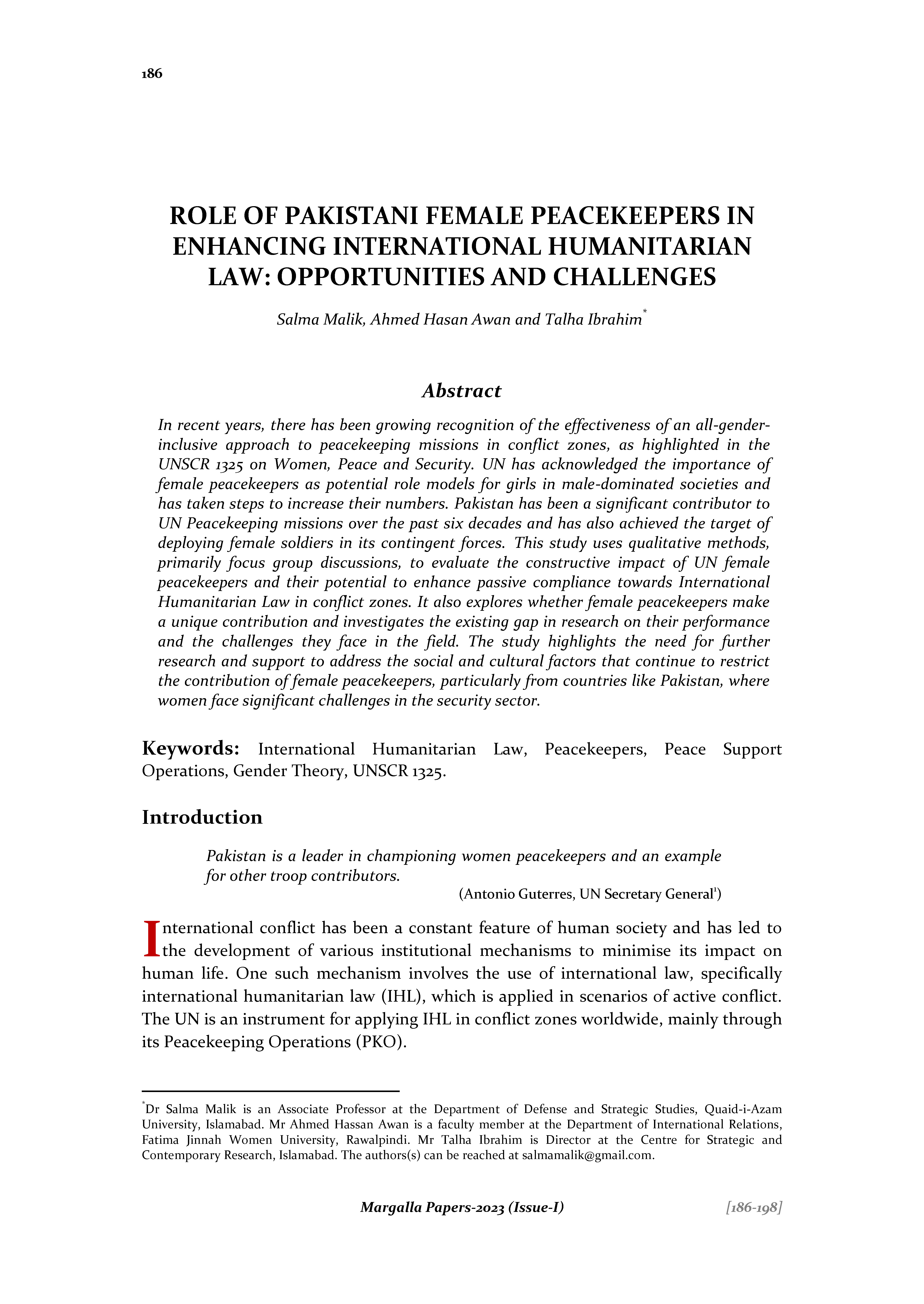ROLE OF PAKISTANI FEMALE PEACEKEEPERS IN ENHANCING INTERNATIONAL HUMANITARIAN LAW: OPPORTUNITIES AND CHALLENGES
DOI:
https://doi.org/10.54690/margallapapers.27.1.163Keywords:
International Humanitarian Law, Peacekeepers, Peace Support Operations, Gender Theory, UNSCR 1325.Abstract
In recent years, there has been growing recognition of the effectiveness of an all-gender-inclusive approach to peacekeeping missions in conflict zones, as highlighted in the UNSCR 1325 on Women, Peace and Security. UN has acknowledged the importance of female peacekeepers as potential role models for girls in male-dominated societies and has taken steps to increase their numbers. Pakistan has been a significant contributor to UN Peacekeeping missions over the past six decades and has also achieved the target of deploying female soldiers in its contingent forces. This study uses qualitative methods, primarily focus group discussions, to evaluate the constructive impact of UN female peacekeepers and their potential to enhance passive compliance towards International Humanitarian Law in conflict zones. It also explores whether female peacekeepers make a unique contribution and investigates the existing gap in research on their performance and the challenges they face in the field. The study highlights the need for further research and support to address the social and cultural factors that continue to restrict the contribution of female peacekeepers, particularly from countries like Pakistan, where women face significant challenges in the security sector.
Bibliography Entry
Malik, Salma, Ahmed Hasan Awan and Talha Ibrahim. 2023. "Role of Pakistani Female Peacekeepers in Enhancing International Humanitarian Law: Opportunities and Challenges." Margalla Papers 27 (1): 186-198.
References
“UN Chief praises Pakistan’s peacekeeping efforts,” The News, February 18, 2020.
Binaifer Nowrojee. “Shattered Lives: Sexual Violence during the Rwandan Genocide and its Aftermath. Human Rights Watch.” 1996.
“More than 11,000 children killed or injured in Yemen,” UNICEF, December 12, 2022.
Farhana Qazi. “The Mujahidaat, Tracing the Early Female Warriors of Islam,” in Women, Gender and Terrorism, ed. L. Sjoberg and C.E. Gentry (Athens Georgia: University of Georgia Press, 2011), p. 35.
Salma Malik. “Pakistani Women Peacekeepers: Role Models, Ambassadors & Icons of Empowerment,” Hilal For Her, December 2022.
Nelly Lahoud. “The Neglected Sex: The Jihadis’ Exclusion of Women from Jihad.” Terrorism and Political Violence 26, no. 5 (2014), pp. 786-793. DOI: https://doi.org/10.1080/09546553.2013.772511
Lise Morjé Howard. UN Peacekeeping in Civil Wars. Cambridge University Press, 2008. DOI: https://doi.org/10.1017/CBO9780511840593
L. M. Howard. “UN Peace Implementation in Namibia: The Causes of Success.” International Peacekeeping, 9(1), 2002. pp.99-132. DOI: https://doi.org/10.1080/714002698

Downloads
Published
How to Cite
Issue
Section
License
Copyright (c) 2023 Salma Malik; Ahmed Hasan Awan, Talha Ibrahim

This work is licensed under a Creative Commons Attribution-NonCommercial 4.0 International License.













